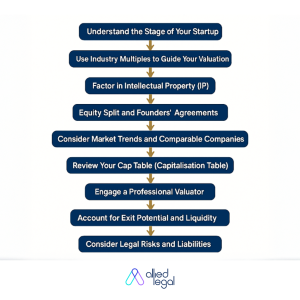Valuing a startup is a critical process for entrepreneurs, investors, and lawyers to ensure fairness in ownership distribution, equity dilution, capital raising, including future funding trajectory and business negotiations. Unlike more mature markets, Australian startups often operate in a thinner capital market, with less competition and fewer benchmarks. That means valuation methods must be tailored to reflect local investor expectations and startup lifecycle stages.
Understanding how to value a startup accurately is essential for the long-term success of your business. In this blog, we will explore practical tips and insights from Australian industry professionals, including legal and financial experts, to help you assess the value of your startup effectively.
Okay, let’s take a look at the checklist to ensure you’re valuing your startup correctly.
-
Understand the Stage of Your Startup
When figuring out how to value a startup, the first step is to recognise the stage your business is at. The valuation method you choose will depend on whether you are in the early-stage or growth-stage.
-
Early-Stage Startups:
At this stage, your startup may not have substantial revenue or assets, making valuation speculative. Early-stage valuation techniques can include straightforward methods such as the Berkus Method and the Scorecard Valuation Method. The Berkus Method evaluates a business idea by identifying four key success factors, making it ideal for very young startups that have not yet generated revenue. On the other hand, the Scorecard Valuation Method uses weighted percentages and market data to determine a reasonable average by comparing the startup to similar companies in the industry. This method takes into account factors such as the startup’s stage, team, traction, product, market size, competitive advantage and region.
Investing in an Early Stage Innovation Company (ESIC), namely, a startup that meets specific criteria set by the Australian Taxation Office (ATO), will provide investors with some tax incentives, such as a tax offset and exemption from capital gains tax. A startup is also attractive to investors if it obtains the R&D Tax Incentive.
-
Growth-Stage Startups:
If your startup has established revenue and growth potential, more traditional methods like Discounted Cash Flow (DCF), which projects future cash flows and discounts back and Comparable Company Analysis are effective but may be highly sensitive to assumptions. These methods focus on your startup’s financial performance and market position. Venture capitalists (VCs) typically focus on the Internal Rate of Return (IRR) and exit value. IRR is a metric used to estimate the potential return on an investment. A higher IRR indicates a better return. Exit value refers to a business or asset’s financial worth when sold or during an IPO. Sophisticated VCs typically seek a return of 7 to 10 times their investment within a period of 5 to 7 years.
Additionally, investors often adjust startup valuations based on factors such as founder experience, traction metrics, product-market fit, intellectual property portfolio, burn rate, the creation of an employee stock ownership plan (ESOP), and future financial needs.
-
Use Industry Multiples to Guide Your Valuation
One of the best ways to assess how to value a startup is by using industry multiples. By comparing your startup to similar businesses in your sector, you can identify an appropriate valuation range.
- Tech startups: These are often valued using a revenue multiple, especially when growth is the focus.
- Other industries: For businesses outside tech, methods like EBITDA multiples or net profit multiples are more suitable.
Industry-specific multiples help you determine a realistic valuation based on market trends. Seeking advice from an Australian lawyer or accountant ensures that the valuation reflects accurate market conditions and trends.
-
Factor in Intellectual Property (IP)
Intellectual Property (IP) can be one of your startup’s most valuable assets. Startups in deep technology and creative industries often have significant IP value, such as patents, trademarks, and proprietary technology. When learning how to value a startup, be sure to factor in the worth of your IP, as it can dramatically increase your business’s overall value.
Partnering with an experienced commercial lawyer is essential to protect your IP and ensure its accurate valuation. Legal protection ensures that your IP is correctly reflected in your valuation, especially when negotiating with investors or potential acquirers.
-
Equity Split and Founders’ Agreements
When learning how to value a startup, the equity distribution between founders plays a crucial role. A fair equity split reflects the value of each person’s contribution, whether that is time, skills, or capital.
Many Australian startups use a vesting model, where equity is earned over time. This protects the company if a founder leaves prematurely. It’s essential to have a Founders’ Agreement in place, which clearly outlines everyone’s responsibilities and ownership stakes.
A lawyer’s input in drafting a clear Founders’ Agreement can help establish the ground rules for equity distribution and avoid future disputes, providing a clearer path to valuation.
-
Consider Market Trends and Comparable Companies
Understanding market trends is key when learning how to value a startup. Valuation often depends on the current economic climate, industry developments, and the performance of similar companies in the sector.
Take a close look at:
- Competitors or businesses with similar models.
- Recent transactions, such as acquisitions or IPOs.
- Industry growth trends, including market size and how your startup fits within the sector.
By staying informed about the market, you can adjust your startup’s valuation to align with industry standards and potential growth. Australian commercial lawyers often consult with industry experts to make sure your valuation is reflective of current market conditions.
-
Review Your Cap Table (Capitalisation Table)
Your Capitalisation Table (Cap Table) is a crucial tool when determining how to value a startup. It shows the distribution of equity among founders, investors, and other stakeholders. This helps determine the company’s current value and how future investments or dilutions will impact ownership.
Make sure you have a clear and updated Cap Table before finalising your valuation. Legal advice ensures your shareholder agreements and investment contracts are structured to protect everyone’s interests as the company grows.
-
Engage a Professional Valuator
To obtain an accurate valuation, it is often best to hire a professional valuator, as overvaluation can hinder future fundraising efforts. These experts specialise in assessing the value of startups and can provide a fair and defensible valuation by reviewing your financial performance, growth prospects, and market positioning.
Partnering with a commercial lawyer in this process ensures that your valuation is legally sound and that all associated agreements are appropriately structured to protect your business interests in the long term.
-
Account for Exit Potential and Liquidity
Startups are often valued based on their exit potential, so it is important to consider your business’s future growth and acquisition opportunities. Investors want to know how and when they will realise a return on their investment.
Legal advice on structuring your exit strategy can play a significant role in ensuring your business is set up for liquidity. Exit clauses outlined by a lawyer define how both investors and founders will realise their equity stake in the event of an acquisition, IPO, or other liquidity events.
-
Consider Legal Risks and Liabilities
Legal issues can significantly affect the valuation of your startup. If your company is facing pending litigation or other regulatory challenges, this could reduce the value. This is why it is crucial to conduct legal due diligence and ensure your business structure, contracts, and IP rights are in order.
By working with an Australian commercial lawyer, you can identify and mitigate risks, which will improve the overall perception and value of your startup.
-
Align with Investor Expectations
When learning how to value a startup, it is important to understand the expectations of potential investors. Australian VCs and angel investors are particularly focused on the growth potential, risk, and exit opportunities associated with your startup.
To secure investment and ensure your valuation aligns with investors’ expectations, it is advisable to work with a commercial lawyer. They can help draft term sheets, shareholders’ agreements, and convertible notes, which can be used to defer valuation to future funding rounds. This collaboration will meet the needs of both you and your investors.
Furthermore, valuation is a negotiation rather than a formula. This indicates that startups must grasp the essence of selling their vision, team, and momentum.
Conclusion
Understanding how to value a startup is a complex but vital step in your entrepreneurial journey. By considering financial models, legal protections, market trends, and investor expectations, you can set a fair and defensible valuation for your business.
Remember, valuing your startup is not just about numbers; it is about creating a sustainable business that will thrive in the long run.
At Allied Legal, helping startups and scaleups prepare for investment, equity splits, and valuation strategies is our bread and butter. If you’re looking for practical, commercial advice to support your next raise or acquisition, our team is here to assist.







